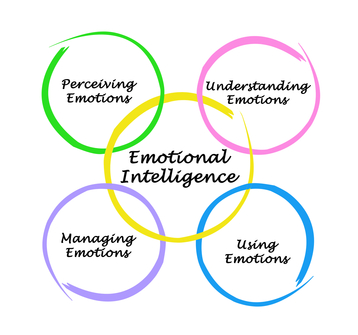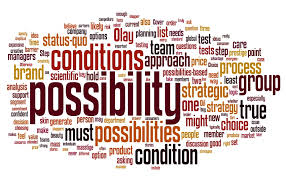Self-Deception & the Need for Self-Actualization by Chessa Peak
Part 3 of a 3 part series. Read part 1 here and part 2 here.
As humans we make a variety of excuses to justify the bad behaviors that keep us in stasis. It is easier to remain in familiar life cycle than to face the unknown. This could possibly explain why a battered women will stay in an abusive relationships. The need to hold ourselves accountable couldn’t be of more importance in society and the individual today.
The mind and our emotions have the power to consume us in repetitive thoughts and feelings. One minute our emotional mind could be fixed in a state of longing and the next minute you could be thinking about making a sandwich. It is the mind’s disposition to be flighty and chaotic. It is important then to understand that we must hold ourselves accountable to training our minds and safe guarding our inner peace.
Intelligently Emotional
 Emotional intelligence is, “Knowing ones emotions, managing emotions, motivating oneself, recognizing emotions in others, & handling relationships.” (Goleman p.43). People who understand their emotions as they arise can make better decisions for their lives. Through conscious acknowledge of our emotions we are capable of transcending beyond their sometimes debilitating grasp. An example of this may be the Buddhist teaching of quieting the mind through meditation, acknowledging the emotion when you see it arise and allowing it to graciously fall away in order to be fully present in this exact moment.
Emotional intelligence is, “Knowing ones emotions, managing emotions, motivating oneself, recognizing emotions in others, & handling relationships.” (Goleman p.43). People who understand their emotions as they arise can make better decisions for their lives. Through conscious acknowledge of our emotions we are capable of transcending beyond their sometimes debilitating grasp. An example of this may be the Buddhist teaching of quieting the mind through meditation, acknowledging the emotion when you see it arise and allowing it to graciously fall away in order to be fully present in this exact moment.
Managing emotions is the ability to embrace resilience and move beyond debilitating emotional strife. One could relate managing emotions as having to focus diligently on your trade while experiencing emotional distress at home. Motivation comes from the ability to maintain self-discipline and not act immediately on wants. By removing emotional reactivity one could better focus on what motivates positive change. What a person wants may not always be what is in their best interests. The ability to recognize emotions in others is self-awareness through empathy. Through empathy we are capable of experiencing life simultaneously with those we wish to strengthen connections with. The term metacognition means “to refer to an awareness of thought process” (Goleman).
Through metacognition, self-discipline and personal accountability it is possible to correct negative thoughts and behaviors. Through patience, temperance and empathy is it possible to correct our emotionally reactive natures and embrace emotional intelligence. Change is possible and it is theorized that it takes “32 days to change a habit” (OnCourse p.147) if the individual is willing to hold themselves accountable and has a sincere desire for change. The stronger one has a desire to change, the more motivated they will be to holding themselves accountable.
Views from Within
Despite how we may see ourselves, we are all very delicate creatures. The resources to pull ourselves out of dysfunctional living are all around us. With great discoveries in neuroscience, behavioral science, & technology being revealed more and more every day, we as a civilization have more information and tools available at our disposal than ever before in history. Through kindred spirits we have the gift of companionship and communication in order to grow together.
Without acknowledging the need to become self-aware and self-actualizing, we will remain disconnected from ourselves and left seeking happiness outside of ourselves. Awakening to how we destroy ourselves can be a very painful experience but one of the most beneficial and expansive experiences of our lives. This process should be addressed within the individual and should be viewed through the internal eyes of compassion and empathy for one’s self. Acting out of self-love  would involve asking yourself in every decision you make, “What would a person who loves themselves do?” (Scott).
would involve asking yourself in every decision you make, “What would a person who loves themselves do?” (Scott).
To be completely honest with ourselves takes tremendous courage as it may require a person to change everything about how they live to attain true and lasting happiness. Self-deceit can be overcome through self-actualization. Happiness is possible, it’s all a matter of how important it is to the individual.
References for the Lost and Found articles can be found here.
*****
[contact-form to=’communitypublishingabq@gmail.com’ subject=’Subscriptions’][contact-field label=’Enjoyed this article? Type in your email address to receive similar articles, no ads, no spam, no charge!’ type=’email’/][/contact-form]
 Chessa Peak has been in New Mexico since the age of 4 and is an honorary New Mexican. A bartender of over 10 years in the Duke City, musician, entreprenuer, and current student at CNM, Chessa is now currently working towards her own non-profit group that will support literacy, art and music programs for Albuquerque residents and her immediate community. Having come through a negative past, her writings deeply reflect the nature of her personal struggles in an attempt to help others overcome their personal battles.
Chessa Peak has been in New Mexico since the age of 4 and is an honorary New Mexican. A bartender of over 10 years in the Duke City, musician, entreprenuer, and current student at CNM, Chessa is now currently working towards her own non-profit group that will support literacy, art and music programs for Albuquerque residents and her immediate community. Having come through a negative past, her writings deeply reflect the nature of her personal struggles in an attempt to help others overcome their personal battles.
Community Publishing brings local artists of all mediums together in creative collaborations for distribution as multimedia books while promoting literacy in our communities. #JoinOurCommunity at http://communitypublishing.org We are proud to be Marketers for the Rail Yards Market.





























